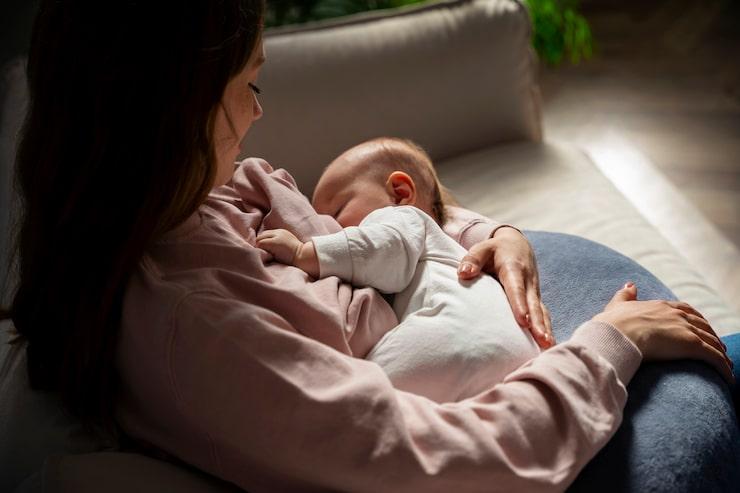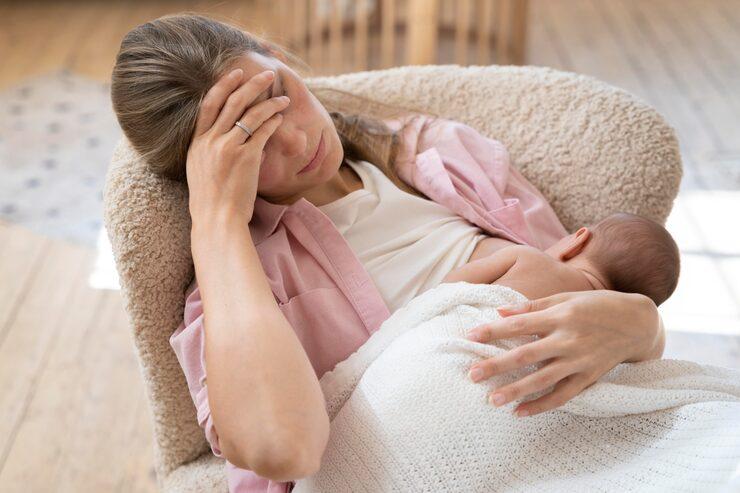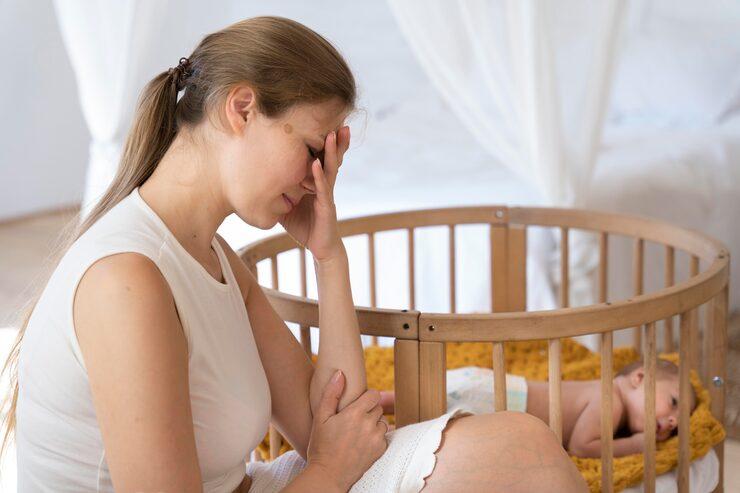What to Expect in the First Six Weeks After Giving birth
New Mother With Her Newborn Child In Her Lap
Pregnancy and having a baby are extraordinary occurrences that make you very happy and change your life in a significant way but many new moms are shocked by how much their bodies and minds require them to heal after having a baby. The time after giving birth, which is often called the "fourth trimester," is equally as essential as the time before.
The first six weeks after giving birth are highly important. Your body heals, your hormones change, and you learn how to care for your child. Knowing what to expect will help you get ready intellectually, emotionally, and physically for the ups and downs of being a new mom.
This blog will talk about the physical recovery, emotional changes, and practical self-care suggestions that all new mothers should know about in the first six weeks after giving birth.
1. Bleeding and discharge from the vagina (lochia) after the birth. It's normal for the vagina to bleed and have discharge after giving birth. This is termed lochia, and it is made up of blood, mucus, and tissue from the uterus.
- During the first few days, the flow is copious and bright crimson. Over the course of a few weeks, it goes from pink to brown to yellowish-white.
- Bleeding normally lasts four to six weeks, but it should get better over time.
- If you see a lot of blood or big clots, call your doctor right away.
2. Pain in the area between the vagina and the anus
- The perineum, which is the area between your vagina and anus, may be sore if you had a vaginal delivery and tore or had an episiotomy.
- Ice packs, sitz baths, and sprays from the pharmacy can all help with the pain.
- Kegel exercises make the muscles in the pelvic floor stronger and help the body recuperate.
3. Getting well after a C-section
- For mothers who have a cesarean section, healing means taking care of the cut that was made during the surgery.
- You might have to avoid heavy lifting or hard work for weeks since the incision site might be painful.
- Cleaning and drying the wound helps it stay healthy.
- The body normally heals in six to eight weeks, but the pain may last longer.
4. Uterine contractions
- After a woman has given birth, her uterus shrinks back to its normal size through contractions called afterpains.
- These contractions could feel like cramps during your period, and they are frequently stronger when you are breastfeeding since oxytocin is released.
- They normally persist between three and seven days.
5. Changes in the breasts
- After you have a baby, your breasts change a lot.
- After giving delivery, it usually takes 2 to 5 days for milk to start flowing.
- When your milk initially comes in, you could feel engorged, which means your breasts are huge and sore.
- Breastfeeding or pumping on a regular basis might help ease pain and stop ducts from being blocked or infected.
6. Being weary and not getting enough sleep
- Taking care of a newborn frequently means staying up all night. A lot of women are very weary in the first six weeks.
- While the infant is napping, you should sleep too.
- If you can, do your evening duties with a friend.
- Don't be afraid to ask your family or friends for support.
Changes in mental and emotional health
New mother with newborn going through emotional and mental changes
1. The Baby Blues
- About 70–80% of new moms get the "baby blues," which are mood swings, irritability, weeping episodes, and worry.
- These normally start a few days after the baby is born and linger for one to two weeks.
- They are caused by changes in hormones, not having enough sleep, and getting used to being a mother.
2. Depression after giving birth (PPD)
- Baby blues aren't as awful as postpartum depression, which lasts longer.
- Some indicators are feeling sad all the time, not wanting to do things, not being able to connect with the baby, and feeling like there is no hope.
- One in seven women has PPD, which is a serious condition that needs to be treated by a doctor.
- Getting help from a doctor or therapist can make a tremendous difference.
3. Anxiety after having a baby
Some mothers may feel anxious and worry too much about their baby's health after giving birth. They may also feel like they are continually on edge. You could need therapy, relaxation techniques, or even medicine from time to time.
4. Changes in who you are and who you know
Having a baby can change who you are and how you and your partner get along. It's crucial to talk to people, be patient, and ask family and friends for aid during this time.
1. After giving birth, constipation and hemorrhoids are frequent issues.
- Constipation can be caused by changes in hormones, iron supplements, and pain in the perineum.
- It will help to drink a lot of water, eat meals that are high in fiber, and not move much.
- You can buy sitz baths and creams without a prescription that might assist with hemorrhoids.
2. Not being able to hold your pee
- Your pelvic floor muscles could not be strong enough to block urine from spilling when you cough, laugh, or sneeze.
- Kegel exercises can help these muscles develop stronger.
- Talk to your doctor if the symptoms don't go away.
3. Hair loss
After giving birth, many women lose more hair than usual for about three to four months. This is because their hormones alter. In most cases, this fades away in a year.
4. Body Image and Weight. A lot of women worry about their bodies after having a kid. Be patient; your body needs time to heal. Slowly losing weight with healthy food and moderate exercise is the best way to do it.
Tips for getting better after having a baby
- Whenever you can, take a rest; you will have to deal with not getting enough sleep, although short naps can help you feel better.
- Eat meals that are good for you. Eating a balanced diet helps you heal, gives you more energy, and makes it easier to breastfeed.
- Drink plenty of water, especially if you are breastfeeding. Staying hydrated is really important.
- To feel better and heal faster, do some light activity, such as walking and pelvic floor exercises.
- Take Help: Let your family and friends help you with tasks like cooking, cleaning, or caring for the baby.
- Take care of your mental health first. If you're feeling anxious, unhappy, or moody, don't be reluctant to seek help.
- See your doctor for checks after you give birth. Doctors usually tell you to come back in six weeks to see how you're healing, talk about birth control, and address any questions you may have.
- Be kind to yourself. It takes time to recover, and you should be nice to yourself while you go through this adjustment.
When to Call Your Doctor
Tired New Mother With New Born
Some symptoms after giving birth are normal, while others need to be checked out by a doctor immediately. Call your doctor if you have any of the following:
- A lot of vaginal bleeding that soaks through more than one pad every hour.
- A big blood clot or a big increase in bleeding.
- Severe pain or swelling in the stomach.
- Signs of infection include redness around the area or an unpleasant smell coming from the cut.
- Pain in the chest or problems breathing.
- Feeling sad all the time, hopeless, or thinking about hurting yourself or your child.
Conclusion
The first six weeks after having a baby are a time to heal, adjust, and learn new things. There are good and unpleasant things about this stage, such as getting in better shape and changing how you feel. If new moms know what to expect, put their own needs first, and ask for help when they need it, they might feel more sure about their recovery after giving birth. For more inquiries, make sure to contact the experts at Prakash Hospital, Noida.
Remember that every woman's journey is unique. Take care of yourself, listen to your body, and ask your loved ones and healthcare team for help. With time and care, rehabilitation goes more easily, and the joys of being a mother come through.



